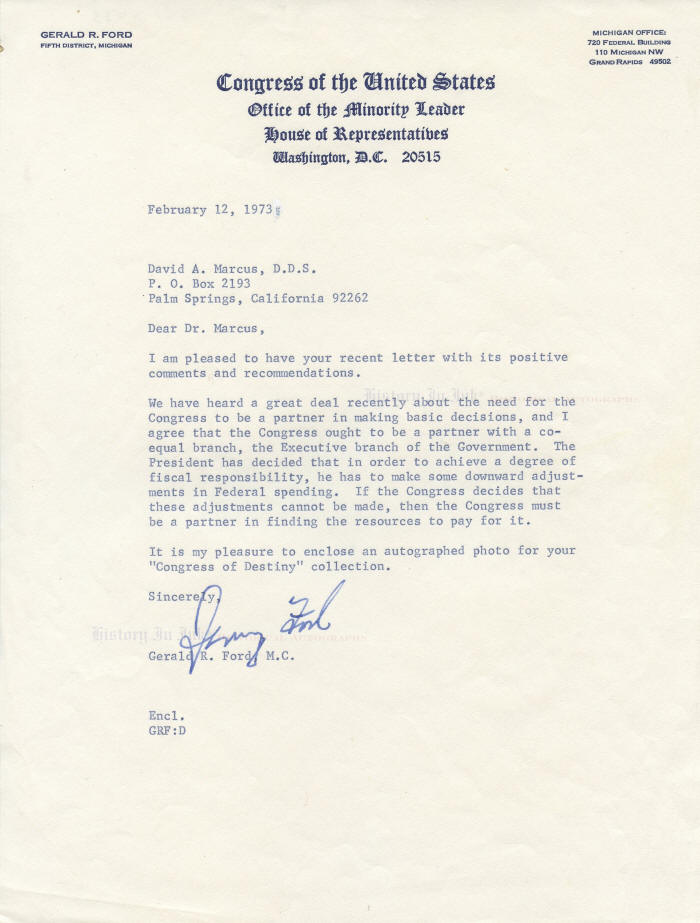1803704
Gerald R. Ford
Scroll down to see images of the item below the description
“I agree that the Congress ought to be a partner with a co-equal branch, the Executive branch of the Government”
Gerald Rudolph Ford, Jr., born Leslie Lynch King, Jr., 1913–2006. 38th President of the United States, 1974–1977. Typed Letter Signed, Jerry Ford, one page, 8” x 10½”, on stationery of the Congress of the United States, Office of the Minority Leader, House of Representatives, Washington, D.C., February 12, 1973.
This is a wonderfully prescient letter by Ford, then the Republican leader of the House of Representatives. Only a few months before he would become Vice President and 18 months before he would become President, Ford writes of the relationship between the President and the Congress and sends a signed photograph (not present) for a “Congress of Destiny” collection.
In this letter, written Ford waxes philosophic about the relationship between the President and the Congress. He writes, in part: “We have heard a great deal recently about the need for the Congress to be a partner in making basic decisions, and I agree that the Congress ought to be a partner with a co-equal branch, the Executive branch of the Government. The President has decided that in order to achieve a degree of fiscal responsibility, he has to make some downward adjustments in Federal spending. If the Congress decides that these adjustments cannot be made, then the Congress must be a partner in finding the resources to pay for it.”
Ford wrote at a time when President Richard Nixon played the role of imperial president, often acting unilaterally in matters of both domestic and foreign policy. In 1969, for example, Nixon enlarged the Vietnam War by ordering secret bombing operations in eastern Cambodia without notifying Congress, which resulted in Congressional enactment of the War Powers Act over Nixon’s veto. In August 1971, in a move that would be known as the “Nixon shock,” he sought to control inflation by unilaterally ordering a freeze on all prices and wages and by suspending convertability of the dollar into gold, thus withdrawing the United States from the Bretton Woods system of financial management that the United States and its allies, including Canada and the countries in Western Europe, had followed since 1944.
As President, Ford stressed cooperation with Congress in his first speech to a joint session of Congress three days after he acceded to the presidency. Ford, who spent nearly 25 years in the House of Representatives, the last eight as the Minority Leader, said that “part of my heart will always be here on Capitol Hill. I know well the coequal role of the Congress in our constitutional process. I love the House of Representatives. I revere the traditions of the Senate despite my too-short internship in that great body. As President, within the limits of basic principles, my motto toward the Congress is communication, conciliation, compromise, and cooperation.”
Ford concludes this letter by noting that it “is my pleasure to enclose an autographed photo for your ‘Congress of Destiny’ collection.” The 93rd Congress, which met from January 3, 1973, to January 3, 1975, was indeed a “Congress of Destiny.” In October 1973, Vice President Spiro T. Agnew, the president of the Senate under the Constitution, resigned in disgrace, which led to Nixon making Ford the nation’s first appointed Vice President on December 6, 1973. In July 1974, the House Judiciary Committee approved three articles of impeachment against Nixon, for obstruction of justice, abuse of power, and contempt of Congress, and reported them to the full House. It was only the second time Congress formally considered impeaching a President. The House of Representatives had not done so in more than 100 years, since impeaching President Andrew Johnson, who was acquitted, in 1868. Of course, Ford, after moving from the House of Representatives to the vice presidency during the 93rd Congress, became President when Nixon resigned on August 9, 1974.
Ford wanted to be the Speaker of the House, but despite his hard work, the Republicans never took control during his tenure. Fate made him the first appointed Vice President and the first President to take office upon the resignation of his predecessor. He remains the only person to hold both offices without being elected to either.
This is a very nice letter that has never been folded. Ford has signed it in blue fountain pen. The letter has two tiny stains in blank areas at the upper left and a couple of unobtrusive handling bends, and there is a pencil notation of what appears to be a telephone number near the upper edge on the back. Overall the letter is in very fine condition.
Unframed. Please ask us about custom framing this piece.
Click here to see more Presidents and First Ladies autographs.







